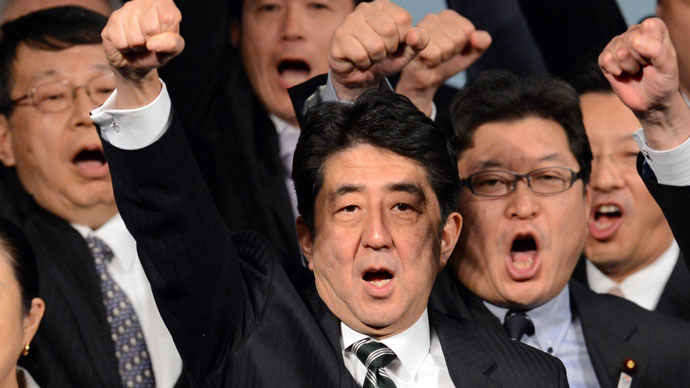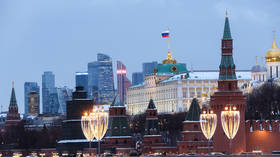Japan’s desperate, dangerous experiment

In Japan, the lost decade quickly turned into the lost 20 years. As the bank of Japan plans to pump about US$1.4 trillion into the economy in roughly two years time, the perilous path to recovery remains a long and winding road.
Twenty-five years ago during the dawn of my financial career, Japan was in the ascendant. While the Nikkei went stratospheric, you could sell a plot of land the size of a small shed in Tokyo and probably buy most of Rhode Island. Families mortgaged their future - quite literally - with loans which could last for three generations to buy a bolthole in Shibuya...or something suburban far removed from downtown.
The bubble burst just as the Soviet Bloc collapsed and Japan went into what has been widely regarded as a remake of 1930’s America albeit with a lot more electronic gadgets.
Of course the truth is often a standard deviation or so away
from the more hysterical headlines and in reality Japan has
ultimately spent almost 25 years more or less marking time.
Property prices collapsed and equities too lost somewhere around
75-80 per cent. Yet Japanese unemployment barely reached 5.5 per
cent at the worst. By comparison, EU industrial powerhouse Germany
right now is around 8 per cent and that looks marvelous compared to
the devastation to be found in the likes of Spain or Greece where a
youth with a job is about as common as a goose laying Faberge
eggs.
Moreover, as developed more and more technology in recent years,
Japan encountered deflation as increasingly efficient services and
products led to prices declining - just like the USA during the
latter part of the 19th century.
Now, Prime Minister Abe, intends to do whatever it takes to get out of the rut. Japanese debt to GDP was below 70 per cent before the asset bubble deflated. Today it stands at an eye-watering 212 per cent! That basket case of government finances Greece officially claims ‘only’ 162 per cent. Even the US looks almost fiscally responsible at around the 101 per cent mark.
Therefore with a new monetary economic approach (read: ‘desperate roll of the dice’) Bank of Japan (BOJ) Governor created either a bid for either economic immortality or harikiri.
With blood red ink for emphasis Governor Haruhiko Kuroda unveiled a target: Japan will have 2 per cent inflation and will do whatever it takes to get there. In essence, the bubble party is long over and the hangover has lasted over 2 decades despite the best efforts of the hosts to feed as much ‘hair of the dog’ to all the guests. Therefore, the only way to get the party started again is to crank up the music and give everybody a personal intravenous drip of as much vodka as they can drink!
Recent stimulus measures include 110 billion dollars for Japanese construction companies alone. The BOJ will spend some 70 billion dollars per month buying Japanese bonds - or more than one Cyprus bailout out per week! Total BOJ stimulus is projected at a staggering 1.5 trillion dollars!
A massive injection of newly printed cash will double the Japanese
money supply, (presumably) increase inflation and reduce the value
of the Yen. The latter is a key part of the strategy as one big
advantage for Germany is that its currency, the Euro, is kept
relatively low by dint of the ongoing financial mess amongst
Berlin’s southern neighbours.
Meanwhile the Abe government appears intent upon attacking vested interests e.g. the uncompetitive utilities which make Japanese retail electricity prices very expensive. There are also ambitious plans to reform agriculture and deregulate in an attempt to progress aspects to the economy which are somewhat sclerotic. These policies make sense and ought to palpably improve the Japanese economy.
However, it is the courageous, if not desperate, financial moves which are understandably grabbing the headlines. The problem of calibrating inflation with any even vague precision has always escaped national policy makers so the danger exists that the Yen could not merely subside but indeed collapse in value leading to all manner of complications. Hyperinflation from deflation is probably unlikely but the ultimate problem for Japan is just how on earth it overcomes a vast, rapidly expanding, debt mountain which would have crippled almost any other nation apart from the thrifty Japanese.
Selling Japanese Government Bonds JGBs has been proving
increasingly challenging as the debt mountain grows. Recently the
Japanese have resorted to advertisements suggesting ‘salarymen’
bachelors can add to their masculine charm by owning bonds. When
buying debt is suggested as a pheromone you know an economy is
really in trouble...
The statements, views and opinions expressed in this column are solely those of the author and do not necessarily represent those of RT.
The statements, views and opinions expressed in this column are solely those of the author and do not necessarily represent those of RT.













